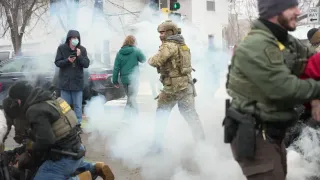December 25, 2020
Democrats Face a Turnout Test in Georgia's Senate Runoffs
Aaron Morrison READ TIME: 5 MIN.
In the first week of early voting for Georgia's Senate runoff election, Casie Yoder parked at a polling location in Cobb County and loaded miniature hand sanitizer bottles, knitted hats, hand warmers and face masks into a collapsible wagon cart.
Her goal: to help voters stay in line in frigid temperatures and cast their ballots in a pair of high-stakes runoff contests that will determine which political party controls the Senate next year. The runoffs will also test whether Democrats can again pull together the diverse coalition that propelled President-elect Joe Biden to victory in Georgia in November and cemented the state's status as a political battleground.
"We've never had an election happen like this in December," said Yoder, the Georgia state captain for the Frontline, a nonpartisan electoral justice project of the Movement for Black Lives and other partner organizations.
For Democrats to win control of the Senate, Georgia's Black communities, as well as the state's smaller Hispanic and Asian communities, likely need to vote in the Jan. 5 runoff election by history-making margins. There is hope that the candidacy of the Rev. Raphael Warnock, the Black senior pastor of the church where Martin Luther King Jr. once preached, might help spur Black votes for both him and fellow Democratic candidate Jon Ossoff over the Republican incumbents, Kelly Loeffler and David Perdue.
An Associated Press VoteCast survey of Georgia voters in November found that 22% of white voters chose Warnock and 28% chose Ossoff, compared to the 90% of Black voters who chose Ossoff and 73% who chose Warnock. Democrats also have an opportunity to capture the 15% of Black voters who chose Matt Lieberman, another Democratic candidate who competed against Warnock in last month's race.
There are signs that turnout in Georgia could indeed be high in the runoffs. Through Wednesday, early voting data released by the office of Georgia's secretary of state show nearly 1.9 million voters have already cast in-person or mail-in ballots since voting opened last week. That's almost half of the total early votes cast in the November general election, with less than two weeks left before the Senate runoff concludes.
Roughly 75,000 people in Georgia have also registered to vote ahead of the runoff, with less than half of those self-identifying as white.
"The old way of just thinking that white voters will determine statewide elections in Deep South states is rapidly fading," said Ben Jealous, president of People For the American Way, a progressive advocacy organization that encourages civic participation.
Black, Hispanic and Asian American Georgians make up increasing segments of the state's registered voters rolls. According to a new Pew Research Center analysis, Black registered voters here increased by about 130,000 between the 2016 presidential election and last month's contest, which was the largest increase of all major racial and ethnic groups in the state. Although far fewer in number, Hispanic and Asian American residents have increased their registration every year for the last three presidential cycles, the Pew analysis shows.
Dolores Huerta, the American labor movement icon and civil rights activist, said the growing size of the Hispanic voting population, particularly among younger voters, has already shifted the organizing strategy for races like the Georgia runoff.
For weeks, several Black and multiracial social justice groups, many of them flush with resources, have been canvassing Georgia communities and airwaves to drive the needed turnout. They're phone banking, sending texts, door knocking, and crisscrossing the state in tour buses and personal vehicles to reach Black and Hispanic Georgians. Many of them said they'll continue outreach through the holidays, putting their own Christmas and New Year's traditions on hold.
Last weekend, Grammy, Oscar and Emmy award-winning hip-hop artist and activist Common was among celebrities who made several stops throughout Georgia, including at a rally for Warnock and Ossoff.
Jealous's organization last week launched a six-figure radio ad buy with the goal of reaching more than one million Black Georgia voters – and especially Black men, who haven't voted in the same margins that Black women have, he said. Similarly, the recently formed Black Lives Matter PAC this week began airing its first TV ad targeting Georgia voters on major broadcast network affiliates and a handful of cable channels.
The ad depicts a Black man out for a jog seeming to overcome the obstacles that might disenfranchise him. It evokes Ahmaud Arbery, a young Black man killed by white men in the coastal Georgia community of Brunswick last February, whose death helped spur this year's national reckoning on systemic racism.
The Rev. James Woodall, the Georgia NAACP president, said he appreciates the resources pouring in from outside of the state. However, he believes victory would come down to homegrown turnout efforts.
"Georgians are organizing Georgians," Woodall said.
In a statement to the AP, Abigail Sigler, spokeswoman for the Georgia Republican Party, said the party was "working tirelessly to ensure all Georgians understand they have a clear choice" in the runoff.
Republicans have focused their efforts on whiter, more rural parts of the state and smaller, more conservative cities, including Valdosta, where Trump held a rally earlier this month. Trump succeeded in the 2020 election in ramping up turnout in similar areas across the country, though it wasn't enough to offset Biden's advantages with minority voters and in large urban centers.
The Working Families Party, a national progressive political movement that has endorsed Warnock, dispatched more than a dozen organizers and several more volunteers to Georgia. A group of them have set up shop at a home garage in a subdivision in Lawrenceville. Last Wednesday, some of them canvassed several neighborhoods that varied along the socioeconomic scale.
"In less affluent neighborhoods, you can see the disparities clearly," said Robert Campbell, a 29-year-old volunteer from the nonpartisan Chicago-based group Social Change, which is helping the Working Families Party with voter outreach.
"It makes you wonder, when's the last time a politician came out here door knocking? Every time they look out their door, they're reminded of their conditions. No wonder they are infrequent voters," Campbell said.
Stephanie Lopez-Burgos, a field director for the Working Families Party for the Gwinnett area, led a group of canvassers in a more affluent Lawrenceville neighborhood. Nearly every home along a pristinely kept cul-de-sac was adorned with Christmas decorations.
"Do you have a plan to vote in the runoff election?" another canvasser, Graco Hernandez Valenezuela, asked Tyrone Vereen, a 62-year-old Black retired police officer who answered the door.
Vereen, who had already mailed in his ballot a week prior, said the events of the last year convinced him it was "time for a change."
At another home in the same neighborhood, 18-year-old Delano Jordan answered the door and told the canvassers that he would be voting for the first time at the polls on Jan. 5.
An aspiring lawyer who currently makes $11 per hour at a sporting goods store, Jordan, who is Black, said he'll support candidates who favor raising the federal minimum wage to $15. Both Ossoff and Warnock have said they support a "livable wage."
"It's going to be hard, but people need the change," Jordan said.
____
Polling reporter Emily Swanson in Washington contributed to this report. Morrison is a member of AP's Race and Ethnicity team. Follow him on Twitter: https://www.twitter.com/aaronlmorrison.






